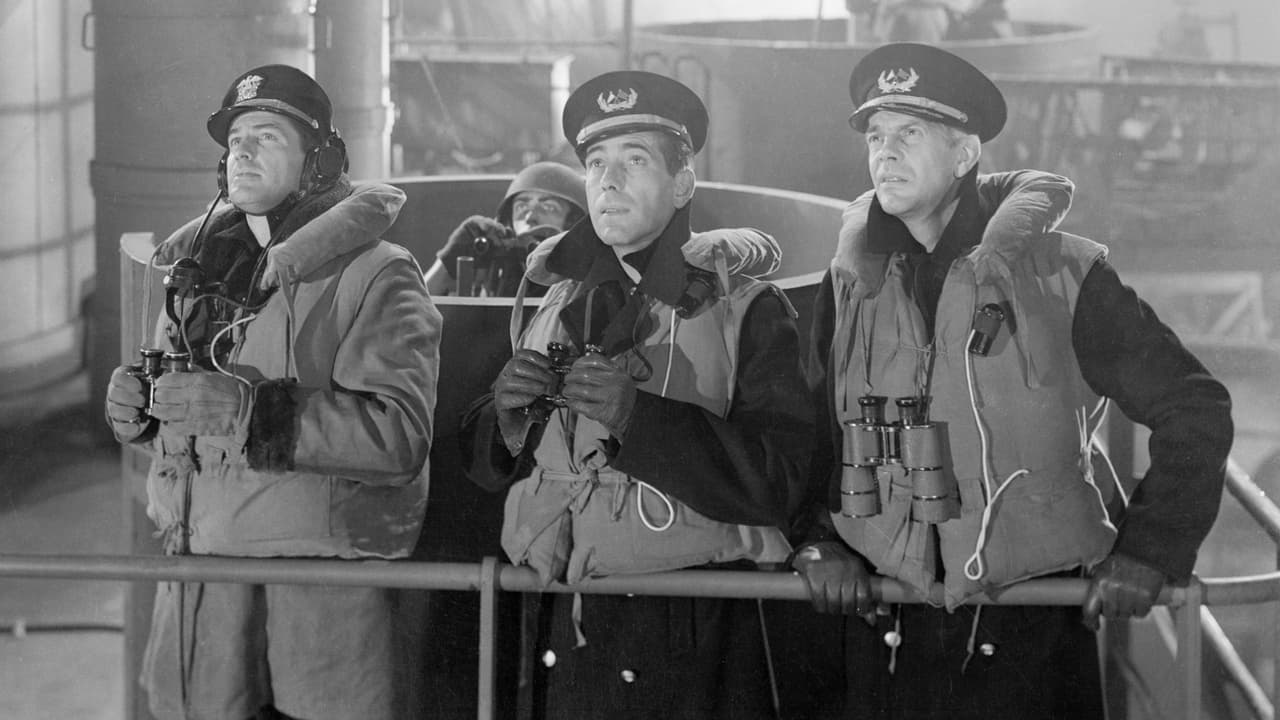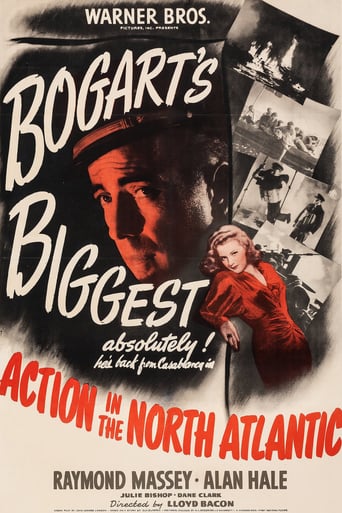Redwarmin
This movie is the proof that the world is becoming a sick and dumb place
Mjeteconer
Just perfect...
pointyfilippa
The movie runs out of plot and jokes well before the end of a two-hour running time, long for a light comedy.
Catherina
If you're interested in the topic at hand, you should just watch it and judge yourself because the reviews have gone very biased by people that didn't even watch it and just hate (or love) the creator. I liked it, it was well written, narrated, and directed and it was about a topic that interests me.
weezeralfalfa
A great flag waver, especially at the end, when Humphry Bogart, as Lt. Rossi, gives an appropriate speech. He had taken over as the de facto commander of the lightly armed Liberty ship Seawitch after Major Jarvis((Raymond Massey) had been incapacitated by enemy fire. Well into the film, after having been blown out of the water by a U boat, the officers were given the new ship to try again. They joined a convoy of merchant ships out of Halifax, each given a particular position to be maintained throughout the transit, if possible. The convoy was taking the northern route across the Atlantic, to the Russian port of Murmansk, on the Barents Sea: an indentation of the Arctic Ocean. They were bringing supplies badly needed for the war effort. Of course, during the transit, the convoy was attacked by a wolf pack, and a number of ships, as well as U boats, sunk. You feel the constant fear of being blown up by a U boat, or occasionally a German light bomber. The Seawitch is separated from the convey during the main attack of the wolfpack, and battles one particular sub, along with a couple of light bombers. Rossi has a very risky trick up his sleeve to hopefully induce the U boat to surface within firing range. Previously, he had a trick to make the U boat think the ship had vanished, at night.
Tad Pole
. . . which is not surprising, since during the past 200 years the only major wars the U.S. actually has won were the two featuring the "Union Label" (namely, the Civil War and WWII), while the haters of the Declaration of Independence have not only succeeded in making all the other conflicts "right to work" wars, but have loused them up into at best, "stalemates," or, at worse, outright losses. This movie highlights one half of the Union movement's two-prong assault on the Axis powers (which had easily conquered all the non-Union countries, such as Spain, Poland, China, the Philippines, and Russia). ACTION IN THE NORTH ATLANT!C screenwriter and good Union man Alvah Bessie wrote some strong Union dialog for the Merchant Marine Unionized heroes who kept the war supplies coming, in turn keeping England and Free France from collapsing, even prior to Pearl Harbor. Though the Republican money moguls who have replaced Jefferson's slogan "one man, one vote" with their own of "one dollar, one vote" immediately stripped Bessie of his writing credit and threw him into federal gulag prison, the true lines he wrote for ACTION IN THE NORTH ATLANT!C's heroes remain enshrined in this film for all eternity (at least until the Corporate hacks turn Orwell's 1984 into reality and successfully delete all human history and science which is not supportive of their ability to make more money). The other, equally vital, prong of the Union drive which won WWII was people such as my grandma, who switched from making valves for trumpets to making the bomb sight which allowed the Enola Gay to target Hiroshima. Other Union workers made the tanks, jeeps, planes, ships, and ammunition which stamped the Union label in the faces of Hitler and Hirohito. America will rise again, once unions include not just Humphrey Bogart, LeBron James, Cecil Fielder, and Brad Pitt, but at least 75% of the U.S. work force. Hopefully, this will come to pass in time to win the next World War!
Merciful_Wolf
My grandfather fought in the U.S. Merchant Marine and lost half a finger while at it, so I perked up when I saw that this film focused on these oft-forgot veterans of WWII. There sure aren't many films about them. In fact, they weren't even given the right to be buried as war veterans until 1988, when President Reagan signed the bill.And happily, it's a solid, interesting film. It doesn't shy away from showing how vulnerable these ships were, how many casualties they could take. Real attention is paid to individual members of the crew. Each one comes from a different walk of life, and they have their own views on the war and whether or not they want to be here. Raymond Massey does a fine job as the experienced, honourable captain, and Bogart takes a break from his dark, cynical characters to play the friendly and wise first-mate. He's still Bogart, of course -- a number of his lines have some of the trademark eloquent wit that he was given in his previous movies (such as Casablanca and The Maltese Falcon). He's worldly-wise, but not grim or disillusioned. He's a bit of a womaniser, but perhaps is not as loose as he pretends to be. He's firm and doesn't believe in nonsense, but has none of the hard cruelty or anger that comes out in his noir or "insane" role (i.e. Treasure of the Sierra Madre). He's as likable and dependable as ever. The other performances range from blandly adequate to quite good, with Alan Hale being as wonderfully likable and friendly as ever as the curmudgeonly comic relief. (love a good alliteration there, heh) The film is quite long, surprisingly. It takes its time to do scenes right, and give things weight. Only one element of the story was rushed, that being Bogart's romance. It doesn't last long, and is rather superfluous anyway. But the film never dragged too much. It could have been trimmed in some areas, but does not suffer badly for it.The special effects are quite impressive, actually. They must have used models for the ship and submarine battles, but darn if they don't look good. There is one shot in particular, near the end: a boat is ramming a surfaced submarine, and the impact is filmed from underwater. It is absolutely convincing, and very dramatic.And yes, it is a patriotic film, though not a fake or overbearing one. These men knew what they were fighting for, and in the movie they talk about it quite a bit. At one point, Bogart expresses the main reason why the experienced merchant mariners keep voluntarily returning to their ships instead of taking constant leave to be with their families. The essence of it is this: "We've spent a lot of time around Nazi ports, and we've seen what they're doing." Keep in mind, this movie was made in 1943, before the full horrors of the Holocaust were known. The Allies didn't know all that was happening yet, but they knew enough to be sure that it had to be stopped.This is not an extraordinary classic, but it is a very fine film, and a good one.
fedor8
Russkie 1: "It's a miracle!" Russkie 2: "That isn't a miracle! It's American seamanship."This is the kind of cheesy dialogue that steadily supplies the viewer in AITNA. This fairly solid little war movie, with some rather obvious occasional stock-footage, is blatant political propaganda. However, there is nothing wrong with that in times of war, especially a war against the Germans. One reviewer here refers to AITNA as a semi-documentary, which was quite a funny thing to read. So does that mean that Ed Wood's films are also semi-documentaries just because he used stock footage? Or was this guy referring to the "unbelievably realistic" dialogue here? Speaking of political propaganda films, if Michael Moore had made a movie about the war in 1943, it probably would have been called "The Nazis Love Their Children, Too", advocating that America immediately surrender. In it, he would have accused the last Republican President for causing the war in the first place.I always preferred this kind of Bogart, the type that doesn't speak through his teeth and says "dame" every 10 seconds.

